
James Earl Carter Jr. is an American politician and humanitarian who served as the 39th president of the United States from 1977 to 1981. A member of the Democratic Party, he served as the 76th governor of Georgia from 1971 to 1975, and as a Georgia state senator from 1963 to 1967. He is the oldest living former U.S. president and the longest-lived president in U.S. history.
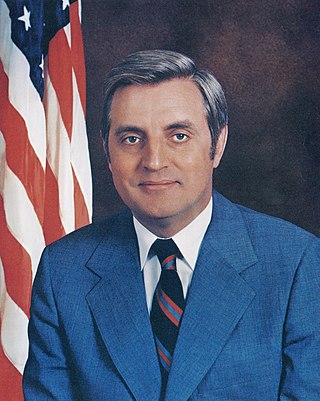
Walter Frederick "Fritz" Mondale was an American lawyer and politician who served as the 42nd vice president of the United States from 1977 to 1981 under President Jimmy Carter. A U.S. senator from Minnesota from 1964 to 1976, he was the Democratic Party's nominee in the 1984 presidential election, but lost to incumbent Ronald Reagan in an Electoral College and popular vote landslide. Reagan won 49 states while Mondale carried his home state of Minnesota and the District of Columbia. His vice presidential nominee, U.S. Representative Geraldine Ferraro from New York, was the first female vice-presidential nominee of any major party in U.S. history.
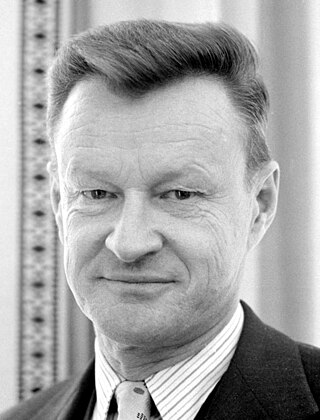
Zbigniew Kazimierz Brzeziński, known as Zbig, was a Polish-American diplomat and political scientist. He served as a counselor to President Lyndon B. Johnson from 1966 to 1968 and was President Jimmy Carter's National Security Advisor from 1977 to 1981. As a scholar, Brzezinski belonged to the realist school of international relations, standing in the geopolitical tradition of Halford Mackinder and Nicholas J. Spykman, while elements of liberal idealism have also been identified in his outlook. Brzezinski was the primary organizer of The Trilateral Commission.
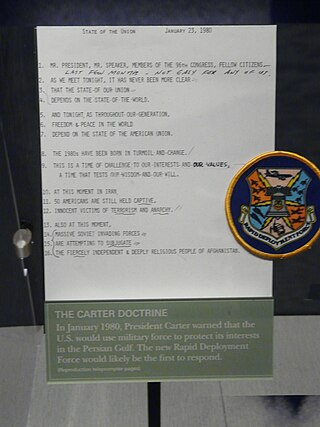
The Carter Doctrine was a policy proclaimed by President of the United States Jimmy Carter in his State of the Union Address on January 23, 1980, which stated that the United States would use military force, if necessary, to defend its national interests in the Persian Gulf. It was a response to the Soviet Union's intervention in Afghanistan in 1979, and it was intended to deter the Soviet Union, the United States' Cold War adversary, from seeking hegemony in the Persian Gulf region.

The Strategic Arms Limitation Talks (SALT) were two rounds of bilateral conferences and corresponding international treaties involving the United States and the Soviet Union. The Cold War superpowers dealt with arms control in two rounds of talks and agreements: SALT I and SALT II.

Cyrus Roberts Vance Sr. was an American lawyer and United States Secretary of State under President Jimmy Carter from 1977 to 1980. Prior to serving in that position, he was the United States Deputy Secretary of Defense in the Johnson administration. During the Kennedy administration he was Secretary of the Army and General Counsel of the Department of Defense.

Richard Charles Albert Holbrooke was an American diplomat and author. He was the only person to have held the position of Assistant Secretary of State for two different regions of the world.

William Anthony Kirsopp Lake is an American diplomat and political advisor who served as the 17th United States National Security Advisor from 1993 to 1997 and as the 6th Executive Director of UNICEF from 2010 to 2017.
A United States presidential doctrine comprises the key goals, attitudes, or stances for United States foreign affairs outlined by a president. Most presidential doctrines are related to the Cold War. Though many U.S. presidents had themes related to their handling of foreign policy, the term doctrine generally applies to presidents such as James Monroe, Harry S. Truman, Richard Nixon, Jimmy Carter and Ronald Reagan, all of whom had doctrines which more completely characterized their foreign policy.
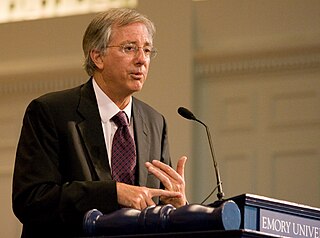
Dennis B. Ross is an American diplomat and author. He has served as the Director of Policy Planning in the State Department under President George H. W. Bush, the special Middle East coordinator under President Bill Clinton, and was a special adviser for the Persian Gulf and Southwest Asia to the former Secretary of State Hillary Clinton.
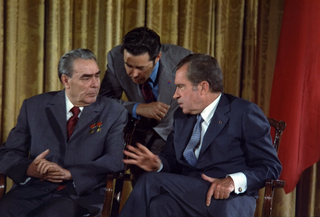
Linkage was a foreign policy that was pursued by the United States and championed by Richard Nixon and Henry Kissinger in the 1970s détente, during the Cold War. The policy aimed to persuade the Soviet Union to co-operate in restraining revolutions in the Third World in return for concessions in nuclear and economic fields. Soviet interventions occurred in various conflicts such as the Angolan Civil War, the Mozambican Civil War, and the Ogaden War, while many revolutions still occurred in Third World countries, undermining the policy.

Robert Malley is an American lawyer, political scientist and specialist in conflict resolution, who was the lead negotiator on the 2015 Iran nuclear deal known as the Joint Comprehensive Plan of Action (JCPOA).

James Braidy Steinberg is an American academic and political advisor, and former United States deputy secretary of state. He has served as the dean of the Paul H. Nitze School of Advanced International Studies (SAIS) at Johns Hopkins University since November 1, 2021. Prior to his deanship, he was a professor at the Maxwell School of Citizenship and Public Affairs at Syracuse University
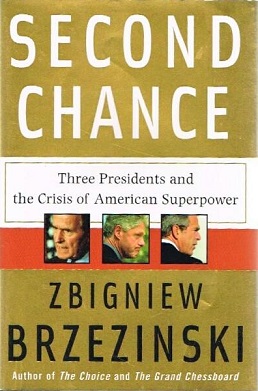
Second Chance: Three Presidents and the Crisis of American Superpower is a 2007 book by Zbigniew Brzezinski, who was President Carter's National Security advisor and a scholar of American foreign policy as a professor at the School of Advanced International Studies at Johns Hopkins University. The book discusses the 15 years of American foreign policy where the U.S., emerging as the "victor" in the Cold War, has been the lone "superpower." Brzezinski writes about how United States presidents George H. W. Bush, Bill Clinton, and George W. Bush have demonstrated leadership and wielded power throughout a decade and a half as the leaders of a virtually unchallenged world power.

Jimmy Carter's tenure as the 39th president of the United States began with his inauguration on January 20, 1977, and ended on January 20, 1981. A Democrat from Georgia, Carter took office after defeating incumbent Republican President Gerald Ford in the 1976 election. His presidency ended following his defeat in the 1980 election to Republican Ronald Reagan. Aged 99, he is the oldest living, longest-lived and longest-married president, and has the longest post-presidency. He is the fourth-oldest living former state leader.

Thomas Edward Donilon is an American lawyer, business executive, and former government official who served as the 22nd National Security Advisor in the Obama administration from 2010 to 2013. Donilon also worked in the Carter and Clinton administrations, including as Chief of Staff of the U.S. State Department. He is now Chairman of the BlackRock Investment Institute, the firm's global think tank.

Ten United States presidents have made presidential visits to the Middle East. The first trips by an incumbent president to countries in the Middle East were those by Franklin D. Roosevelt, and were an offshoot of Allied diplomatic interactions during World War II. To date, 16 visits have been made to Egypt, 12 to Saudi Arabia, 11 to Israel, six to both Iraq, Jordan and Turkey, four to Iran, three to the Palestinian Territories, two to both Kuwait and Syria, one to Bahrain, Georgia, Oman, Qatar, and to the United Arab Emirates. No incumbent American president has yet visited Armenia, Azerbaijan, Cyprus, Lebanon, and Yemen.

The post-presidency of Jimmy Carter began on January 20, 1981, following the end of Jimmy Carter's term as president. Carter was the 39th president of the United States, serving from 1977 to 1981. Carter's post-presidency is widely considered by historians and political analysts to be one of the most accomplished of any former U.S. president. After leaving office, Carter remained engaged in political and social projects, establishing the Carter Center, building his presidential library, teaching at Emory University in Atlanta, and writing numerous books, ranging from political memoirs to poetry. He also contributed to the expansion of the nonprofit housing organization Habitat for Humanity.

The United States foreign policy during the presidency of Jimmy Carter (1977–1981) was dominated by the Cold War, a period of sustained geopolitical tension between the United States and the Soviet Union.
















